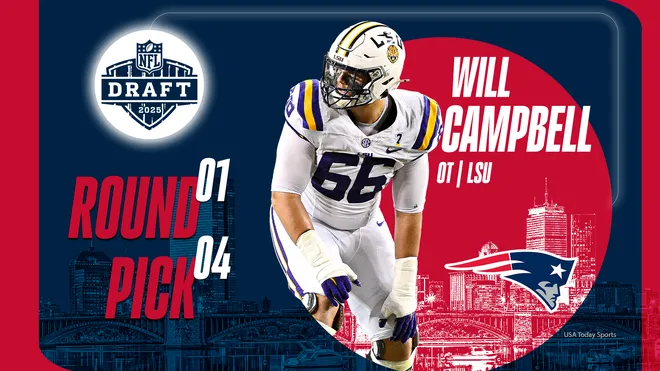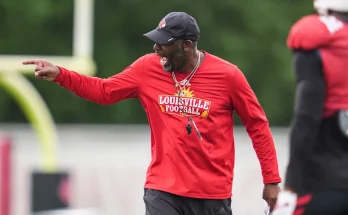Will Campbell’s name being called as the No. 4 overall pick in the 2025 NFL Draft marked a turning point not only in his life, but also for the franchise that selected him. The moment, charged with raw emotion and the culmination of years of relentless work, placed the LSU standout firmly in the spotlight. Drafted by the New England Patriots, Campbell instantly became a cornerstone of their rebuild—one that’s centered around protection, power, and pride.
For Campbell, the journey to that moment began long before he stepped onto the field at Lambeau, suited in a custom black tuxedo with gold accents. It started in Monroe, Louisiana, where he first gained national attention as a high school standout with a rare blend of strength, footwork, and leadership. From day one at LSU, Campbell proved he was no ordinary freshman. Starting all 38 games in his college career, he not only met expectations—he exceeded them. He was the embodiment of consistency, resilience, and grit, qualities that had NFL scouts circling his name for over a year leading into the 2025 draft.
The Patriots saw in Campbell what so many others had failed to capitalize on in recent seasons—security on the offensive line. It was no secret that the franchise had struggled to keep its quarterbacks upright in the years following the Tom Brady era. Even with Drake Maye under center as the presumed future of the team, there was skepticism surrounding whether New England could develop the infrastructure needed for a young quarterback to flourish. Campbell’s selection at No. 4 was the team’s boldest answer to that question.
At 6-foot-6 and 319 pounds, Campbell brings more than just physical dominance. His presence in the locker room has been described as “mature beyond his years,” and his impact on a team’s culture is just as influential as his play on the field. He doesn’t shy away from the spotlight, but he doesn’t seek it either. Instead, he lets his work speak for him—snapping into his stance, driving defenders into the turf, and walking quietly back to the huddle. The Patriots, long defined by a no-nonsense approach, seemed to find in Campbell a player who fit their ethos but offered a youthful spark.
Critics of the pick pointed to positional value, with some arguing that taking an offensive lineman in the top five was a conservative move. But for New England, whose offensive woes in recent seasons were often rooted in a lack of protection, this was no ordinary offensive lineman. Campbell wasn’t just a safe pick—he was a necessary one. He dominated the SEC, college football’s most competitive defensive conference, and showed an ability to adapt, recover, and neutralize even the most explosive edge rushers.
The emotional resonance of his selection was clear. Cameras captured Campbell embracing his mother, Holly, and his longtime girlfriend, Ashlynn Nussmeier, in the green room moments after his name was announced. There were tears, there were cheers, but most of all, there was an unmistakable sense of destiny fulfilled. Campbell had often spoken about how much he dreamed of playing in the NFL, but he had never lost sight of what got him there: faith, family, and football.
Mike Vrabel, the Patriots’ newly-appointed head coach, wasted no time in praising his new left tackle. In post-draft interviews, Vrabel praised Campbell’s toughness, high football IQ, and relentless motor. “We didn’t just draft a lineman,” Vrabel said. “We drafted a tone-setter. A guy who will walk in, get to work, and make us better on day one.” That kind of endorsement carries weight coming from Vrabel, a former linebacker known for his own physical style of play and understanding of what it takes to win in the trenches.
Campbell’s willingness to take on leadership roles was evident throughout his college career. As a sophomore, he was already one of the vocal leaders in the LSU locker room. Teammates often turned to him not just for guidance on the field, but also for how to handle the challenges that come with the spotlight. Whether it was bouncing back after a tough loss or navigating NIL distractions, Campbell was often the steadying force. That poise under pressure is part of what made him so attractive to NFL teams, especially a franchise like New England that has endured turbulence in recent seasons.
While much of the attention on draft night centered around quarterbacks and skill position players, Campbell’s selection served as a reminder of the importance of the offensive line—an area often overlooked until it becomes a glaring weakness. The Patriots, who are retooling their offense and hoping to develop Maye into a franchise quarterback, didn’t just draft a protector; they drafted a partner in that process. Campbell’s job, as he put it during a post-draft interview, is simple: “I’ll do whatever it takes to keep Drake upright. I’ll die protecting my quarterback.”
That mentality, while dramatic, underscores Campbell’s blue-collar approach. His technique is polished, his hands are violent, and his kick slide is smooth for a man his size. NFL scouts raved about his footwork and body control, noting that even in pressure situations, he rarely loses leverage. He’s not just a mauler in the run game—he’s a technician in pass protection, able to adjust mid-play and recover from false steps with minimal impact on the quarterback’s rhythm.
There’s also a sense of humility that sets Campbell apart. Despite his accolades and draft position, he has remained grounded. In interviews, he often deflects praise to his teammates, his offensive line coach at LSU, and the support system that raised him. He speaks with the wisdom of a veteran, not a rookie, and his transition to the NFL is expected to be smoother than most.
For the Patriots, this pick was also about sending a message. After years of middling results, questionable draft decisions, and an identity crisis following Bill Belichick’s departure, New England planted its flag with a player who represents stability and strength. Campbell might not be flashy, but he’s foundational. And in today’s NFL, where edge rushers are faster, stronger, and more creative than ever, there’s nothing more valuable than a left tackle you can count on.
As Campbell prepares for his first NFL season, expectations will be high. He’ll be tasked with protecting one of the most scrutinized young quarterbacks in the league, adjusting to complex defensive schemes, and playing in a city that demands results. But if his past is any indication, he won’t just rise to the challenge—he’ll embrace it. He’s built for the grind, forged in SEC battles, and driven by a work ethic that refuses to be outdone.
The next chapter in Will Campbell’s football journey begins in Foxborough, but his story is far from complete. The Patriots didn’t just add a lineman—they added a leader, a warrior, and a player whose ceiling remains tantalizingly high. As the team begins to reshape its identity and climb back into contention, they’ll do so with No. 66 anchoring the blind side.
For fans, coaches, and teammates alike, Will Campbell represents hope. Hope that the pieces are falling into place. Hope that the offensive line is no longer a liability. And hope that, with Campbell paving the way, the future of New England football is starting to look a lot more like its championship past.



